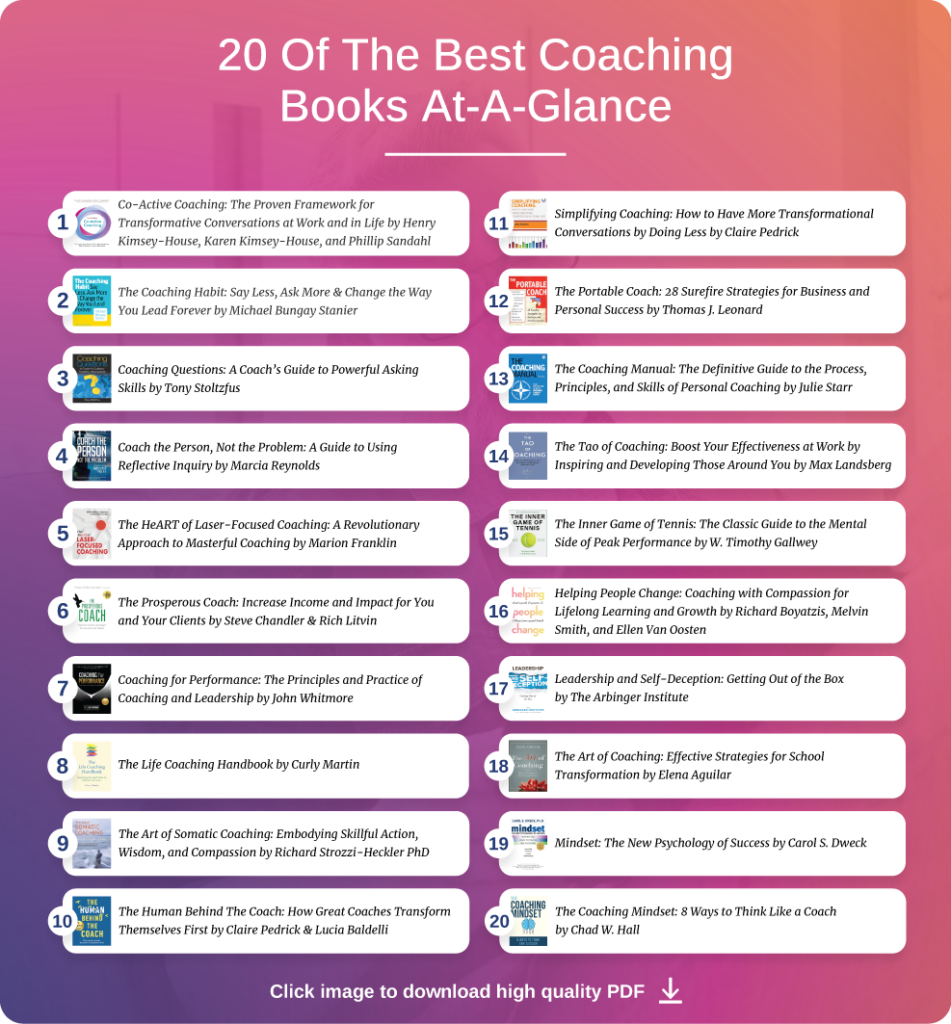Do you aspire to become a transformative coach that helps others become all they were made to be? Maybe you are still dreaming about your coaching career or getting ready to launch your new business. Or, perhaps you are already a practicing coach wanting to learn and refine your skills to be increasingly confident and effective at what you do. No matter where you are in your journey as a transformative coach, you will always benefit from continuous learning and reflection. To equip you on your journey, we have curated a list of 20 of the best coaching books that offer diverse perspectives and practical tools to elevate your coaching skills.
1. Co-Active Coaching: The Proven Framework for Transformative Conversations at Work and in Life, by Henry Kimsey-House, Karen Kimsey-House, and Phillip Sandahl
This foundational text introduces the Co-Active Coaching Model, emphasizing collaboration and viewing clients as inherently resourceful. It provides practical tools for engaging in powerful coaching conversations that lead to deep, transformational change.
Who Should Read:
- Coaches who want to facilitate transformative results in both personal and professional contexts
- Practitioners seeking a comprehensive framework for impactful coaching
Explore the Co-Active Coaching model further with this special offer.
2. The Coaching Habit: Say Less, Ask More & Change the Way You Lead Forever, by Michael Bungay Stanier
Stanier emphasizes the power of asking insightful questions to help clients with self-discovery and accountability. The book offers practical techniques to foster a coaching culture where clients take ownership of their development.
Who Should Read:
- Coaches working with leaders in corporate settings
- New coaches who want to enhance their questioning and listening skills
3. Coaching Questions: A Coach’s Guide to Powerful Asking Skills, by Tony Stoltzfus
This resource offers over 1,000 sample coaching questions and guidance on structuring effective coaching conversations. It covers various coaching scenarios, aiding coaches in refining their inquiry skills.
Who Should Read:
- Coaches who want to improve their questioning techniques
- Those seeking to structure more impactful coaching sessions
4. Coach the Person, Not the Problem: A Guide to Using Reflective Inquiry, by Marcia Reynolds
Reynolds teaches five essential practices for reflective inquiry encouraging coaches to move beyond problem-solving to facilitate deeper client transformation. The book emphasizes active listening and open-ended questioning.
Who Should Read:
- Coaches who want to foster deeper client reflection
- Practitioners focused on personal development coaching
5. The HeART of Laser-Focused Coaching: A Revolutionary Approach to Masterful Coaching, by Marion Franklin
Franklin explores the importance of concise, impactful coaching conversations. She provides techniques for developing precision in communication, enabling coaches to facilitate meaningful change efficiently.
Who Should Read:
- Coaches seeking to master concise coaching methods
- Executive and leadership coaches aiming for high-impact sessions
6. The Prosperous Coach: Increase Income and Impact for You and Your Clients, by Steve Chandler & Rich Litvin
This book focuses on building a successful coaching business, offering client acquisition and retention techniques. It helps coaches understand the business aspects of coaching to enhance both income and impact.
Who Should Read:
- Coaches looking to increase their networks and grow their practice
- Entrepreneurs looking for specific resourcing for the coaching industry
7. Coaching for Performance: The Principles and Practice of Coaching and Leadership, by John Whitmore
Whitmore introduces the GROW model and covers coaching fundamentals applicable to leadership and management. The book bridges the gap between coaching and organizational success.
Who Should Read:
- Coaches in business and corporate settings
- Executive leaders who want to enhance their coaching skills
8. The Life Coaching Handbook, by Curly Martin
Martin covers the business and practice of life coaching, offering tools for client transformation, sustainability as a coach, and insights into marketing coaching services.
Who Should Read:
- Life coaches and personal development professionals who are starting their practices
- NLP practitioners, counselors, training professionals, and human resources managers
9. The Art of Somatic Coaching: Embodying Skillful Action, Wisdom, and Compassion, by Richard Strozzi-Heckler PhD
Strozzi-Heckler focuses on the connection between body, mind, and coaching, providing somatic techniques to enhance coaching effectiveness and help clients develop deeper self-awareness.
Who Should Read:
- Coaches interested in somatic and embodied coaching techniques
- Those working with clients on emotional intelligence and resilience
10. The Human Behind The Coach: How Great Coaches Transform Themselves First, by Claire Pedrick & Lucia Baldelli
This book emphasizes self-awareness and personal growth in coaching, encouraging deep reflection on becoming an effective coach and aligning your values with your practice.
Who Should Read:
- Coaches committed to self-development
- Those looking to deepen their coaching presence
11. Simplifying Coaching: How to Have More Transformational Conversations by Doing Less, by Claire Pedrick
Pedrick advocates for a minimalist coaching approach, helping coaches be more present and effective by removing unnecessary complexity in coaching.
Who Should Read:
- Coaches looking to refine their approach
- Those seeking a simpler and more effective coaching method
12. The Portable Coach: 28 Surefire Strategies for Business and Personal Success, by Thomas J. Leonard
Leonard is considered the father of personal coaching. He provides step-by-step coaching strategies covering personal development and success principles, helping coaches create structured coaching plans.
Who Should Read:
- Executive coaches and life coaches
- Anyone interested in self-coaching strategies
13. The Coaching Manual: The Definitive Guide to the Process, Principles, and Skills of Personal Coaching, by Julie Starr
This bestselling book is globally recognized as a crucial coach training tool. It provides a step-by-step guide to coaching, covering core principles, essential skills, and real-life case studies. It focuses on practical applications for coaches at any level.
Who Should Read:
- Coaches looking for a structured coaching methodology
- Those new to coaching who need a practical, comprehensive guide
14. The Tao of Coaching: Boost Your Effectiveness at Work by Inspiring and Developing Those Around You, by Max Landsberg
Inspired by Eastern philosophy, this book presents coaching as a way to unlock human potential, offering simple, practical coaching techniques for the workplace.
Who Should Read:
- Managers and leaders looking to integrate coaching into their leadership style
- Coaches who prefer a holistic, philosophy-based approach
15. The Inner Game of Tennis: The Classic Guide to the Mental Side of Peak Performance, by W. Timothy Gallwey
Although originally about sports, this bestselling book is among the best coaching books. It introduces the concept of self-coaching and mastering internal dialogue, making it a valuable resource for performance coaching. Endorser, Bill Gates, suggests this book is useful in many areas of life.
Who Should Read:
- Coaches interested in mindset and mental performance coaching
- Athletes, business professionals, and personal development enthusiasts
16. Helping People Change: Coaching with Compassion for Lifelong Learning and Growth, by Richard Boyatzis, Melvin Smith, and Ellen Van Oosten
This book highlights coaching with empathy and compassion rather than compliance, emphasizing long-term behavioral change.
Who Should Read:
- Coaches who want to create sustainable, positive change in clients
- Leaders and HR professionals focused on organizational development
17. Leadership and Self-Deception: Getting Out of the Box, by The Arbinger Institute
Though not strictly a coaching book, this work explores how self-awareness and mindset shifts can transform relationships and leadership. It teaches how to see others more clearly and coach effectively.
Who Should Read:
- Coaches focusing on mindset and leadership transformation
- Leaders who want to improve their coaching and interpersonal skills
18. The Art of Coaching: Effective Strategies for School Transformation, by Elena Aguilar
Focused on coaching in educational settings, this book offers strategies for supporting teachers and school leaders in their professional growth. The model Aguilar presents for transformational coaching is a valuable professional development tool for coaching educators, school system teachers, and those at the district level of education.
Who Should Read:
- Coaches working in education or training settings
- Educational leaders and administrators looking to implement coaching strategies
19. Mindset: The New Psychology of Success, by Carol S. Dweck
This groundbreaking book is among the best coaching books because it introduces the concept of a fixed versus growth mindset and how shifting one’s mindset impacts learning, success, and personal development—key principles in coaching.
Who Should Read:
- Coaches interested in motivation and behavioral change
- Educators, business leaders, and anyone working in personal development
20. The Coaching Mindset: 8 Ways to Think Like a Coach, by Chad W. Hall
This book examines the mental shifts necessary for good coaches to become great coaches. He explores the core principles of effective coaching and how to apply curiosity and active listening.
Who Should Read:
- New and aspiring coaches pursuing professional development
- Leaders looking to adopt a coaching mindset in management
20 Best Coaching Books At-A-Glance: Free Download

Elevate Your Coaching Techniques With Co-Active
This article highlighted 20 of the best coaching books—just a sample of the high-level resources available that provide invaluable insights into coaching techniques, business development, leadership, and personal transformation. Whether you are an aspiring coach or an experienced practitioner, investing in practical tools for development will grow your confidence and ability to empower clients and build a thriving coaching practice.
Co-Active Training Institute offers development tools for all levels along the coaching pathway, including a free Toolkit for the curious, webinars for those considering a vocation in coaching, and Coach Training and Leadership Development pathways that have yielded successful coaches for more than three decades
Learn about the Co-Active Fundamentals of Coaching Course today by checking out our special offer on Co-Active Coaching: The Proven Framework for Transformative Conversations at Work and in Life, by Henry Kimsey-House, Karen Kimsey-House, and Phillip Sandahl.

